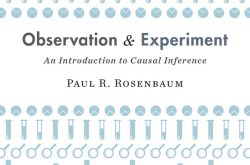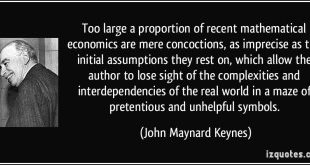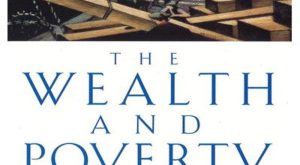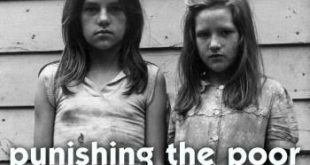Kan Chile så kan Sverige! På SvD Debatt argumenter idag Gunilla Andersson och yourst truly för att beslutet att släppa in vinstdrivande företag i välfärdssektorn har varit ett dyrköpt misstag. I Chile satte man på skolområdet stopp för detta för ett par år sedan. Sverige är nu det enda land i världen som accepterar vinstintresse i skattefinansierade skolor. Men — kan Chile rätta till misstag så borde vi också kunna! Grundfrågan är inte om skattefinansierade...
Read More »Observation and experiment
Paul Rosenbaum’s latest book — Observation and experiment: an introduction to causal inference — is a well-written introduction to some of the most important and far-reaching ideas in modern statistics. With only a minimum of mathematics, the author manages to give a lively and interesting account of how statisticians try to use statistics to make causal inferences from observational studies and experiments. For non-graduate social science students with no or little...
Read More »Valaam Monastery — Agni Parthene
Valaam Monastery — Agni Parthene [embedded content] [h/t Eric Schüldt] Advertisements
Read More »Debunking mathematical economics
The belief in the power and necessity of formalizing economic theory mathematically has thus obliterated the distinction between cognitively perceiving and understanding concepts from different domains and mapping them into each other. Whether the age-old problem of the equality between supply and demand should be mathematically formalized as a system of inequalities or equalities is not something that should be decided by mathematical knowledge or convenience. Surely it would...
Read More »Econometric disillusionment
Because I was there when the economics department of my university got an IBM 360, I was very much caught up in the excitement of combining powerful computers with economic research. Unfortunately, I lost interest in econometrics almost as soon as I understood how it was done. My thinking went through four stages: 1. Holy shit! Do you see what you can do with a computer’s help. 2. Learning computer modeling puts you in a small class where only other members of the caste can...
Read More »Woman is the nigger of the world
Woman is the nigger of the world [embedded content] The economic implications of gender discrimination are most serious. To deny women is to deprive a country of labor and talent, but — even worse — to undermine the drive to achievement of boys and men. One cannot rear young people in such wise that half of them think themselves superior by biology, without dulling ambition and devaluing accomplishment … To be sure, any society will have its achievers no...
Read More »Seven economic fundamentals
[embedded content] Advertisements
Read More »What austerity preachers do not get
What austerity preachers do not get We are not going to get out of the economic doldrums as long as we continue to be obsessed with the unreasoned ideological goal of reducing the so-called deficit. The “deficit” is not an economic sin but an economic necessity … The administration is trying to bring the Titanic into harbor with a canoe paddle, while Congress is arguing over whether to use an oar or a paddle, and the Perot’s and budget balancers seem eager...
Read More »Soziale mobilität in Deutschland und Schweden
Soziale mobilität in Deutschland und Schweden Denn Eltern-Kind-Vergleiche gab es in den vergangenen Jahrzehnten schon diverse, und diese ergaben oft, dass der Status der Eltern nur wenig Einfluss auf denjenigen ihrer Nachkommen und deren Einkommens-perspektiven gehabt habe. Selbst der Nobelpreisträger Gary Becker stützte diese These in den späten Achtzigerjahren noch. Die neue Studie nun, die drei und teilweise sogar vier Generationen miteinander...
Read More »Wren-Lewis’ bizarre critique of MMT
Wren-Lewis’ bizarre critique of MMT Now we can see why MMT is so popular … We are in an MMT world, where we should be using fiscal policy and not worrying about the deficit, but policymakers don’t understand that. I think most mainstream macroeconomists do understand this, but we are not often heard. The ground was therefore ripe for MMT. Policymakers following austerity when they clearly should not annoys me a great deal, and I am very happy to join common...
Read More » Lars P. Syll
Lars P. Syll








